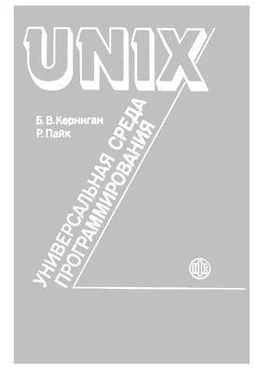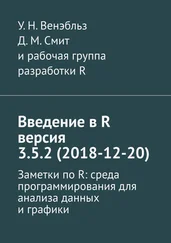argv++;
}
if (argc < 2)
error("Usage: %s [-10] command", progname);
if ((pid=fork()) == 0) {
execvp(argv[1], &argv[1]);
error("couldn't start %s", argv[1]);
}
signal(SIGALRM, onalarm);
alarm(sec);
if (wait(&status) == -1 || (status & 0177) != 0)
error("%s killed", argv[1]);
exit((status >> 8) & 0377);
}
onalarm() /* kill child when alarm arrives */
{
kill(pid, SIGKILL);
}
#include "error.c"
length($0) > 72 { print "Line", NR, "too long:", substr($0,1,60) }
ttyin() /* process response from /dev/tty (version 1) */
{
char buf[BUFSIZ];
FILE *efopen();
static FILE *tty = NULL;
if (tty == NULL)
tty = efopen("/dev/tty", "r");
if (fgets(buf, BUFSIZ, tty) == NULL || buf[0] == 'q')
exit(0);
else /* ordinary line */
return buf[0];
}
ttyin() /* process response from /dev/tty (version 2) */
{
char buf[BUFSIZ];
FILE *efopen();
static FILE *tty = NULL;
if (tty == NULL)
tty = efopen("/dev/tty", "r");
for (;;) {
if (fgets(buf,BUFSIZ,tty) == NULL || buf[0] == 'q')
exit(0);
else if (buf[0] == '!') {
system(buf+1); /* BUG here */
printf("!\n");
}
else /* ordinary line */
return buf[0];
}
}
#include "system.c"
/* vis: make funny characters visible (version 1) */
#include
#include
main() {
int c;
while ((c = getchar()) != EOF)
if (isascii(c) &&
(isprint(c) || c=='\n' || c=='\t' || c==' '))
putchar(c);
else
printf("\\%03o", c);
exit(0);
}
/* vis: make funny characters visible (version 2) */
#include
#include
main(argc, argv)
int argc;
char *argv[];
{
int с, strip = 0;
if (argc > 1 && strcmp(argv[1] , "-s") == 0)
strip = 1;
while ((c = getchar()) != EOF) if (isascii(c) &&
(isprint(c) || c=='\n' || c=='\t' || c==' '))
putchar(c);
else if (!strip)
printf("\\%03o", c);
exit(0);
}
/* vis: make funny characters visible (version 3) */
#include
#include
int strip = 0; /* 1 => discard special characters */
main(argc, argv)
int argc;
char *argv[];
{
int i;
FILE *fp;
while (argc > 1 && argv[1][0] == '-') {
switch (argv[1][1]) {
case 's': /* -s: strip funny chars */
strip = 1;
break;
default:
fprintf(stderr, "%s: unknown arg %s\n",
argv[0], argv[1]);
exit(1);
}
argc--;
argv++;
}
if (argc == 1)
vis(stdin);
for (i = 1; i < argc; i++)
if ((fp=fopen(argv[i], "r")) == NULL) {
fprintf(stderr, "%s: can't open %s\n",
argv[0], argv[i]);
exit(1);
} else {
vis(fp);
fclose(fp);
}
exit(0);
}
vis(fp) /* make chars visible in FILE *fp */
FILE *fp;
{
int c;
while ((c = getc(fp)) != EOF)
if (isascii(c) &&
(isprint(c) || c=='\n' || c=='\t' || c==' '))
putchar(c);
else if (!strip)
printf("\\%03o", с);
}
/* waitfile: wait until file stops changing */
#include
#include
#include
char *progname;
main(argc, argv)
int argc;
char *argv[];
{
int fd;
struct stat stbuf;
time_t old_time = 0;
progname = argv[0];
if (argc < 2)
error("Usage: %s filename [cmd]", progname);
if ((fd = open(argv[1], 0)) == -1)
error("can't open %s", argv[1]);
fstat(fd, &stbuf);
while (stbuf.st_mtime != old_time) {
old_time = stbuf.st_mtime;
sleep(60);
fstat(fd, &stbuf);
}
if (argc == 2) { /* copy file */
execlp("cat", "cat", argv[1], (char*)0);
error("can't execute cat %s", argv[1]);
} else { /* run process */
execvp(argv[2], &argv[2]);
error("can't execute %s", argv[2]);
}
exit(0);
}
#include "error.c"
# watchfor: watch for someone to log in
PATH=/bin:/usr/bin
case $# in
0) echo 'Usage: watchfor person' 1>&2; exit 1
esac
until who | egrep "$1"
do
sleep 60
done
# watchwho: watch who logs in and out
PATH=/bin:/usr/bin
new=/tmp/wwho1.$$
old=/tmp/wwho2.$$
> $old # create an empty file
while : # loop forever
do
who >$new
diff $old $new
mv $new $old
sleep 60
done | awk '/>/ { $1 = "in: "; print }
/</ { $1 = "out: "; print }'
# which cmd: which cmd in PATH is executed, version 1
case $# in
0) echo 'Usage: which command' 1>&2; exit 2
esac
for i in `echo $PATH | sed 's/^:/.:/
s/::/:.:/g
s/:$/:./
Читать дальше
Конец ознакомительного отрывка
Купить книгу







![Александр Мещеряков - Terra Nipponica [Среда обитания и среда воображения]](/books/393699/aleksandr-mecheryakov-terra-nipponica-sreda-obitani-thumb.webp)

